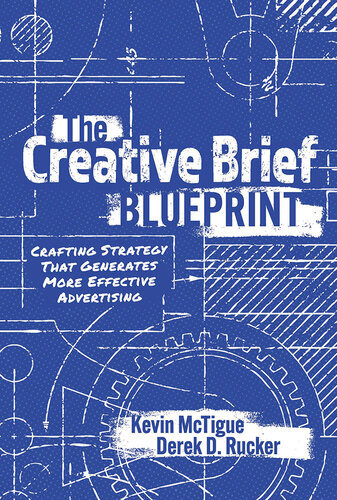

Most ebook files are in PDF format, so you can easily read them using various software such as Foxit Reader or directly on the Google Chrome browser.
Some ebook files are released by publishers in other formats such as .awz, .mobi, .epub, .fb2, etc. You may need to install specific software to read these formats on mobile/PC, such as Calibre.
Please read the tutorial at this link: https://ebookbell.com/faq
We offer FREE conversion to the popular formats you request; however, this may take some time. Therefore, right after payment, please email us, and we will try to provide the service as quickly as possible.
For some exceptional file formats or broken links (if any), please refrain from opening any disputes. Instead, email us first, and we will try to assist within a maximum of 6 hours.
EbookBell Team

4.0
56 reviewsAs the world of marketing communications has become more tactically complex, the strategy behind the work has suffered. Most ads aren't good. They don't achieve the results that the company desires. They end up costing precious time and money. Neither you nor the target like to look at them either. Humanity has been creating marketing communications for over 8000 years. You would think people would be good at this by now.
The problem is people aren't good at it. Rather, as technology has improved, people have become better at learning just how bad they are. As brands are able to test more efficiently, they are witnessing less effective and even ineffective advertising. As brands have become able to produce spots more effectively, they're seeing more rounds of development that increase costs. And, as brands continue to recognize the value of clear marketing communications, the client-agency relationship has continued to deteriorate. A vicious cycle is upon us where brands are spending large sums of money to learn that the advertising was ineffective; rather than fix the problems, they simply repeat—we are in our very own version of "Groundhog's Day."
This book is designed to give readers the tools they need to achieve meaningful improvement in their communications now and in the future. This book seeks to break the cycle of ineffective strategy and creative and help brands steer their marketing communications towards meaningful results and success. In the Creative Brief Blueprint, Kevin McTigue and Derek Rucker merge decades of academic insights and practical experience to offer an approachable and actionable guide to crafting successful communications strategy. This strategy is brought to life via a concise and precise "creative brief" that acts as the blueprint for creative work.
In each chapter, the authors explain a particular part of the brief, review the value of the brief element to both clients and agencies, identify why brands fail and how to succeed, and answer common queries with regard to myths, misconceptions, and other questions.
Tactics will continue to evolve at a rapid pace, but the need for sound strategy is present now more than ever. This book gives readers the tools they need to achieve meaningful improvement in their communications now and in the future.